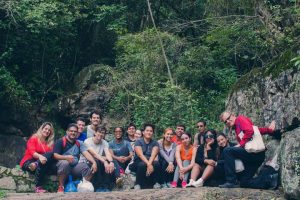
By Joe Beck
I was not sure what to expect when I stepped off the plane in Rio de Janeiro. It had been about ten years since I was last in Brazil when I visited São Paulo with family and in drastically different circumstances. I understood that we were scheduled to stay in a historically stigmatized place called the Baixada Fluminense, but beyond that, I had no idea what day-to-day activities would entail other than the outline of what the Cost of Opportunity team did last year.
Because I have not taken part in a research trip before, I was not sure what work I was qualified to do. Regardless of what my workload would be, I was glad that I could practice Portuguese and visit the country of my ancestors. I did not anticipate all I was going to learn. First of all, I saw firsthand the stark contrasts between the wealthy, vibrant, tourist-mecca Rio de Janeiro and the vilified, branded, surrounding region, which is known as the Baixada Fluminense. The airport staff member’s shocked expression when I told him where I would be spending my time in Brazil revealed exactly how the Baixada is perceived – a place to be ashamed of and forgotten.
The Baixada was significantly poorer than Rio, which largely results from the legacy of slavery. It is composed of a high proportion of people of African descent as opposed to the well-known neighborhoods of Rio like Copacabana and Ipanema, which are majority white. That contrast led to discussions about race, which taught me aspects of Brazil I had never known. For example, in Brazil, the conception of race is much more fluid than in the United States. Racial identity is more of a color gradient as opposed to distinct categories of White or Black. A person in Brazil can identify as either Pardo (of partial African descent) or Preto (of primarily African descent), whereas in the United States a person would largely be regarded as Black or White, and typically not much in between. Although some dedicate their lives in revealing racial injustice, many Brazilians problematically either believe that racism is not a problem in Brazil or is not a problem that they themselves espouse. The reality, however, is that people of a darker skin color face far more prejudice than others, and many people, wittingly or not, perpetuate the discrimination.
Prior to the trip, I thought of myself as informed about Brazilian affairs, including topics such as race. I was surprised by how ignorant I actually was. My Brazilian grandmother practically lives at home with me, I speak Portuguese at home, and we watch O Globo (a Brazilian news network). As far as I was concerned, Brazil was a model on which the United States ought to emulate in order to eliminate racial bigotry and hostility. However, I knew little about the true nature of how lighter-skinned Brazilians systematically oppress other, darker-skinned individuals.
Another aspect of the trip that left a large impression on me was the impact the Cost of Opportunity’s work had upon others in the Baixada, and in particular the work by community educator and rapper Dudu as well as Stephanie Reist. We went to various locations to screen the film that Dudu and Stephanie produced last year. The film detailed barriers to upper education that many people who attend the newly opened university face every day. And now that this recently afforded right is being attacked by the Temer administration, people in the community are responding ferociously and emotionally. Many people to whom we had shown the film cried because they felt so poignantly attacked by the federal government upon their right afforded by the Brazilian constitution to a quality upper education. Many times I found myself with a lump in my throat when watching the effect of the film upon high school students in the community as they talked about their own struggles that come with living in the Baixada and ultimately trying to better their lives through higher education.
Seeing the importance of the work that the Cost of Opportunity team is doing made me reflect upon how I want to contribute to the project in the future. I am interested in analyzing the data that would assist in revealing the university’s economic impacts on the Baixada. What became clear by the end of my two weeks in Brazil was that the work we were doing was larger in magnitude than mere academic research, and in fact transcended the academic sphere. It appeared that the Brazilian counterpart of the research team would use many of the findings we work on at Duke as part of a larger political operation. I hope that what I contribute to the group in terms of academic results can be used as evidence of the beneficial effects of universities in the fight for increased access to education.
